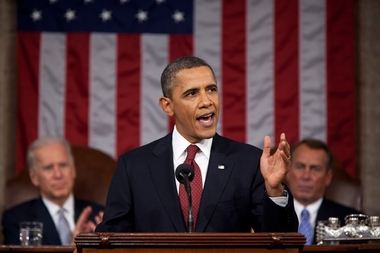State of the Union Analysis: Obama isn't in the mood for compromise

NEDRA PICKLER,Associated Press
An AP News Analysis
WASHINGTON (AP) — President Barack Obama had a simple message for Republicans in Congress: Do it my way.
Forget about shutting down the government to force spending cuts, he told the GOP in Tuesday night's State of the Union address. Don't think about defaulting on the debt and, while you're at it, close tax loopholes.
Clearly, Obama wasn't in a mood to compromise.
The president's speech doubled down on his hard-charging inaugural address in promoting liberal Democratic policy ideas, without ceding any ground to Republicans in Congress.
And from Obama's point of view, why should he? The president is fresh off a convincing re-election victory and Republicans are soul-searching over their party's future, increasingly reluctant to put up a fight. The GOP leadership already flinched by giving in on the debt ceiling and tax hikes. Obama seems determined to see what else he can get out of them.
At a time when Republicans are insisting on spending cuts, Obama pushed more public spending on universal preschool, construction work on bridges and schools and a jobs program rebuilding vacant homes in rundown neighborhoods. He pushed for an increase in the minimum wage to $9 an hour, with future increases tied to the cost of living. And he continued to push in support of left-leaning social issues including gun control, immigration reform, climate change and advancing equal rights for gays.
These were issues he didn't prioritize in his first term as he grappled with two wars and a recession — and faced a re-election bid in which he needed to campaign for America's middle. But fresh off his convincing victory, unburdened by the prospect of another campaign, he has a rare and fleeting moment to push a second-term agenda that could shape his legacy.
The risk is he will alienate Republicans and accelerate gridlock. But Obama warned that voters won't look kindly on a stalemate.
"The American people don't expect government to solve every problem," he argued. "They don't expect those of us in this chamber to agree on every issue. But they do expect us to put the nation's interests before party. They do expect us to forge reasonable compromise where we can. For they know that America moves forward only when we do so together and that the responsibility of improving this union remains the task of us all."
Obama ridiculed Republican calls for cuts to spending on things like education, job training and Medicare and Social Security benefits to reduce the deficit. "Deficit reduction alone is not an economic plan," Obama said.
"Let's set party interests aside and work to pass a budget that replaces reckless cuts with smart savings and wise investments in our future. And let's do it without the brinksmanship that stresses consumers and scares off investors. The greatest nation on earth cannot keep conducting its business by drifting from one manufactured crisis to the next," Obama said to a sustained standing ovation from Democrats in the chamber while Republicans sat silent.
Obama did say he was "open to additional reforms from both parties" on Medicare, as long as they don't jeopardize Americans' retirement security. It was his one notable invitation to entertain Republican ideas, without making any promises or offering any specifics.
In the Republican response to Obama's address, Sen. Marco Rubio of Florida said the president has a habit of "falsely attacking" the motives of anyone who opposes his agenda. Rubio said Obama's "favorite attack" is to accuse Republicans of caring only about the rich, but tax increases and deficit spending hurt the middle class.
"Mr. President," Rubio responded, "I don't oppose your plans because I want to protect the rich. I oppose your plans because I want to protect my neighbors."
For now, Americans are far happier with Obama's leadership than they are with Congress. A recent Associated Press-GfK poll found that 54 percent of registered voters approve of the job Obama is doing, compared with just 17 percent for Congress.
But that isn't preventing Republicans from digging in their heels. House Speaker John Boehner told television correspondents and anchors Tuesday that immigration is about the only item on Obama's list that has a chance of passing this year. He said the president is more interested in getting a Democratic majority in both chambers next year and he doesn't believe Obama "has the guts" to take on liberals in his party over spending cuts.
Obama recognized that the divided Congress may not fall in line behind all his priorities, specifically mentioning climate change, but said he'd move forward with or without their support. "If Congress won't act soon to protect future generations, I will," Obama said. "I will direct my Cabinet to come up with executive actions we can take, now and in the future, to reduce pollution, prepare our communities for the consequences of climate change and speed the transition to more sustainable sources of energy."
The White House is acutely aware that Obama must act fast if he wants to be a transformational leader. The president has maybe a year before electoral politics tends to accelerate the already nasty gridlock between the White House and Republican lawmakers.
That's because come next year, members of Congress will be focused on their own campaigns for the midterm election. Then attention focuses on the race to succeed Obama with the primary campaign taking shape in 2015.
___
EDITOR'S NOTE — Nedra Pickler covers the White House for The Associated Press.





